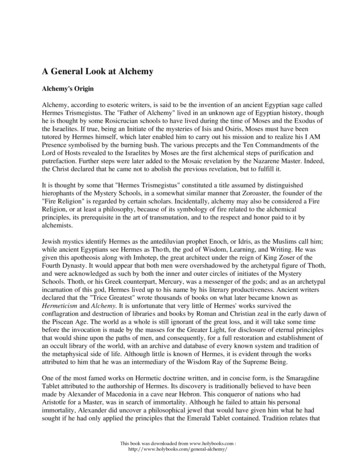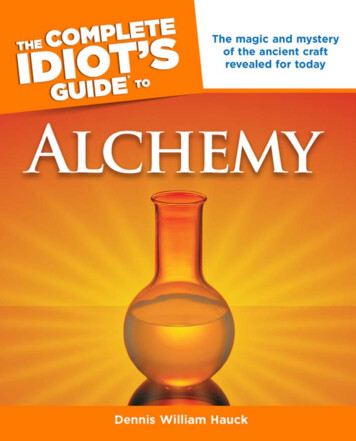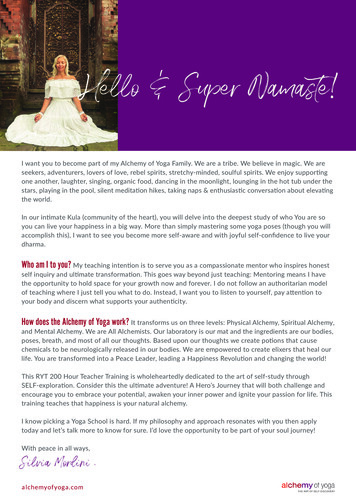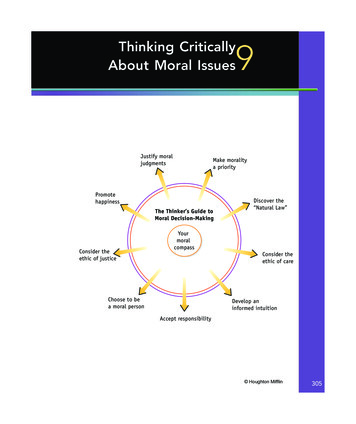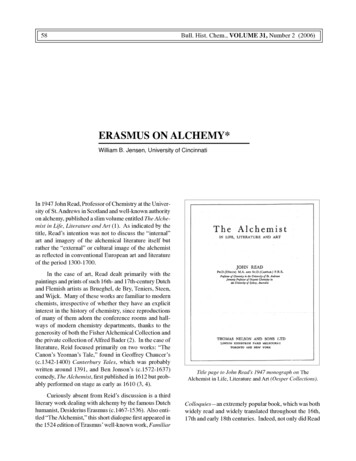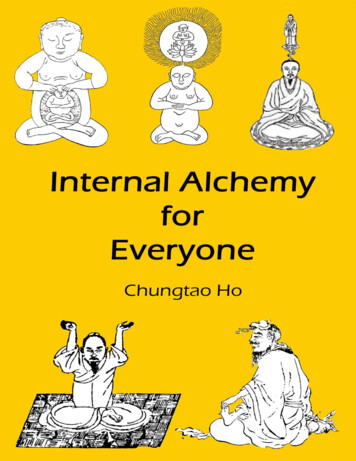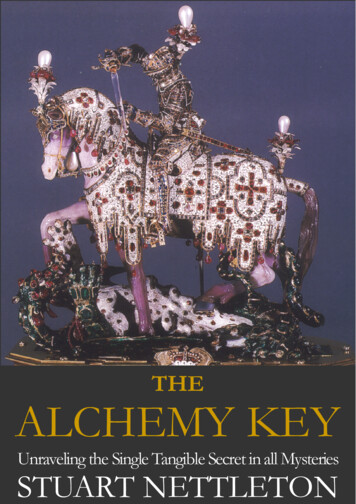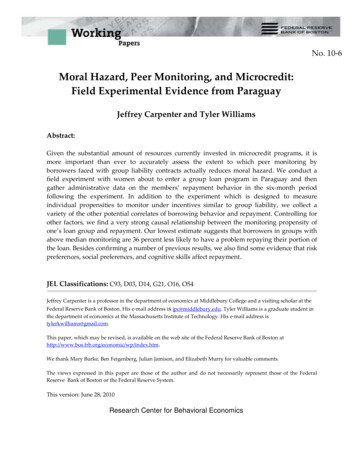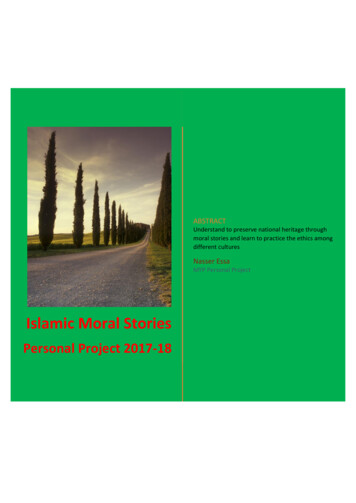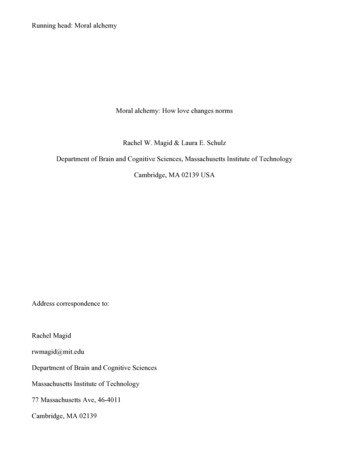
Transcription
Running head: Moral alchemyMoral alchemy: How love changes normsRachel W. Magid & Laura E. SchulzDepartment of Brain and Cognitive Sciences, Massachusetts Institute of TechnologyCambridge, MA 02139 USAAddress correspondence to:Rachel Magidrwmagid@mit.eduDepartment of Brain and Cognitive SciencesMassachusetts Institute of Technology77 Massachusetts Ave, 46-4011Cambridge, MA 02139
MORAL ALCHEMY2AbstractWe discuss a process by which non-moral concerns (that is concerns agreed to be non-moralwithin a particular cultural context) can take on moral content. We refer to this phenomenon asmoral alchemy and suggest that it arises because moral obligations of care entail recursivelyvaluing loved ones’ values, thus allowing propositions with no moral weight in themselves tobecome morally charged. Within this framework, we predict that when people believe a lovedone cares about a behavior more than they do themselves, the moral imperative to care about theloved one’s interests will raise the value of that behavior, such that people will be more likely toinfer that third parties will see the behavior as wrong (Experiment 1) and the behavior itself asmore morally important (Experiment 2) than when the same behaviors are considered outside thecontext of a caring relationship. The current study confirmed these predictions.
MORAL ALCHEMY3Moral alchemy: How love changes normsMoral dilemmas in psychology play a critical role in probing our intuitions and revealingthe complexities underlying our moral judgments. In the interest of understanding thefoundations of moral reasoning, people have been asked if it is okay to sacrifice one person tosave five (e.g., Cikara, Farnsworth, Harris, & Fiske, 2010; Crockett, Clark, Hauser, & Robbins,2010; Cushman, 2015; Foot, 1967; Mikhail, 2000; 2007), accept stolen goods (Haidt, 2007;Haidt & Graham, 2007) burn, poison, or shock someone (Crockett, Kurth-Nelson, Siegel, Dayan,& Dolon, 2014; Cushman, 2008; Young, Cushman, Hauser, & Saxe, 2007), have sex withsiblings or dead chickens (Graham, Haidt. & Nosek, 2009; Haidt, 2001; Haidt, Bjorklund &Murphy, 2000; Haidt, Koller & Dias, 1993; Prinz, 2006; Young & Saxe, 2011), smother babies(e.g., Greene, Nystrom, Engell, Darley, & Cohen, 2004), eat dead pets (Wheatley & Haidt,2005), steal drugs (Kohlberg, 1969), harm the environment (Knobe, 2003; 2004; Malle, 20004),smash plates (Piaget, 1932), yank hair (Blair, Marsh, Finger, Blair & Luo, 2006; Nichols, 2002;Nucci, 2001; Turiel, 1983), push someone downhill (Hamlin, Wynn, & Bloom, 2007;Kuhlmeier, Wynn & Bloom, 2003), and desecrate the flag (Gray & Ward, 2011; Haidt et al.,1993). Scenarios like these have revealed surprising subtleties and dissociations in our moralreasoning. Thanks to such thought experiments, we know that the purview of moral reasoningincludes not just considerations of harm and fairness, but considerations of authority, loyalty, andpurity (Haidt, 2001; see also Blair et al., 2006; Blair, 2009; Haidt & Graham, 2007; Haidt &Joseph, 2007; Rai & Fiske, 2011; Shweder & Haidt, 1993; Shweder, Much, Mahapatra, & Park,1997). We know that judgments of intentionality differ for violations of harm and violations ofpurity (Young & Saxe, 2011), differentially influence our intuitions about blame and punishment(Cushman, 2008), and change depending on the causal structure of morally significant events
MORAL ALCHEMY4(Knobe, 2003; 2004; Mikhail, 2000; 2007). Moral thought experiments have furthered ourunderstanding of the early development (e.g., Hamlin & Wynn, 2011; Hamlin et al., 2007; 2010)and neural bases (Crokett et al., 2010; Decety, Michalska, & Kinzler,, 2012; Greene, et al., 2004;Young, et al., 2007; Young, et al., 2010; Young & Dungan, 2012; Young & Saxe, 2008; 2011) ofmoral reasoning, and have launched vigorous debates on the relative contributions of judgmentsbelieved to be rapid, automatic, and affective and those believed to be slow, effortful, andcognitive (see Cushman, 2015 for review).The extent of these contributions to the psychology of moral reasoning is perhaps themore striking because the moral scenarios that enabled them are, prima facie, remote fromhuman psychology. Most of us will live all our lives without encountering anything very like thedilemmas above. We do of course enact decisions which trade off the good of a few against thegood of many, engage in sexual behaviors others might deem perverse, subordinate the needs ofinfants to other goals, exploit animals and the environment, engage in economic injustices,commit acts of physical aggression, and behave irreverently and disrespectfully. However, to thedegree that we worry about such things, we are generally not worried about what to do but aboutthe fact that we do what we shouldn’t; the most disturbing aspect of real-world analogues ofthese scenarios may be our capacity for indifference (Singer, 1972). As scientists, the thoughtexperiments are satisfying because they reveal the paradoxes and ambiguities lurking beneathour moral certitudes. Arguably however, these scenarios reveal the precarious foundation of ourmoral convictions while leaving our moral anxieties untouched. This is not to say that people donot also sometimes confront ethical challenges with imagination and courage (a topic ofpsychological and philosophical inquiry in its own right; Anderson, 1999; Railton, 1986; Singer,
MORAL ALCHEMY51981) but this too arguably contrasts with the moral quandaries that preoccupy us the rest of thetime.Moral alchemyHere we are interested in “the rest of the time”: times when we experience neither moralconviction nor moral complacency, although the stakes (in comparison to the scenarios above)are relatively low. We suggest that the scenarios we experience as moral dilemmas do nottypically involve questions of intentionality, or pressing conflicts between utilitarian anddeontological ends. Rather we believe that many of our everyday moral anxieties center on caseswhere there is a conflict between our belief in any proposition (including morally neutral ones)and our belief that actions consistent with that proposition will upset someone we love. It is inthis sense that love can lead to what we will call moral alchemy: caring for others (and indeedthe moral obligation to do so) allows propositions with little or no moral weight in themselves tobecome morally charged. To be very clear, our hypothesis is distinct from the claim that ourmoral values depend on the values of our close others; many researchers have investigated thedegree to which our sense of moral value is affected by moral contagion, or social affiliation (seee.g., Eskine, 2013; Haan, Smith, & Block, 1968; Haidt & Hersh, 2001; Hoffman, Wisneski,Brandt, & Skitka, 2014). Here we are interested in cases where although our own opinion aboutthe actual rightness or wrongness of the behavior may remain unchanged, we nonetheless assignthe behavior an elevated moral status.We will start with a trivial example: the moral status of Pogs. (For those of you who wereneither a parent nor child in the 1990’s, Pogs are collectible colored disks, originally from bottlecaps.) Clearly in the world at large, if someone steps on a Pog, uses one to prop up a table leg, orpublically disparages them on national TV, he is morally blameless. He is morally blameless
MORAL ALCHEMY6even if he knows that Pogs are valued by millions of school children in his culture. Supposehowever, your child comes up to you and says, “Pogs are the best thing ever.” Most of us wouldbe (morally) appalled if you replied, “Pogs are stupid” and snapped a Pog in two.Of course what is bad in this example is hurting your child’s feelings, not hurting Pogs.Nonetheless, we suggest that the effect of moral alchemy is to (locally) change the moral statusof Pogs. You cannot disregard them as objects worthy of care and attention without insufficientlyvaluing your child’s values. Critically however, and in contrast to other arbitrary objects thatattain moral significance through their association with culturally important moral values (Moll& Schulkin, 2009; Shweder et al., 1987; Turiel, Killen, & Helwig, 1987), Pogs are not valuablebecause of a symbolic connection to other core values; nor did you reclassify Pogs as agents (asfetuses and non-human animals may be classified; Brandt & Rozin, 2013; Singer, 1995). Pogsdid have social-conventional value (for children in the ‘90’s, as a kind of currency) but that isirrelevant here; assuming Pogs have no social currency in 2016, snapping a Pog in front of yourPog-smitten child is still egregious. All that matters is that you knew he cared about Pogs andyou did not take his utilities as your own. Note that this is neither moral contagion nor moralduplicity: you do not adopt your child’s attitude of valuing Pogs for their own sake but neither doyou merely act “as if” you care about Pogs when you do not. Rather, insofar as, and for as longas, failing to care about Pogs would be hurtful to your child, you represent Pogs as objectsworthy of care (e.g., you would likely feel guilty about intentionally destroying a Pog, even inprivate).Of course many morally neutral things can take on moral content in specific contexts.Basement stairs for the parents of toddlers, or earthquakes for residents of the Pacific Northwest,can be morally relevant insofar as failures to attend to them appropriately could cause harm (and
MORAL ALCHEMY7subsequent guilt). Critically however, stairs and earthquakes don’t lose (and may even increase)their moral relevance if the potential victims are indifferent or oblivious to the risk: stairs areintrinsically dangerous to toddlers and earthquakes to Oregonians. Although care for others canmake many things, innocuous in themselves, an appropriate target of our moral anxieties, herewe reserve the term moral alchemy for transformations of non-moral to moral content thatdepend solely on others’ mental states. Because such transformations require insight into others’unique goals, preferences, values, and beliefs, and because only mental state dependent harmsare possible candidates for moral transformation, we believe these are particularly important withrespect to moral learning.Why important? It is after all, uncontroversial that people value idiosyncratic things andthat morality requires respecting things that others value. However, we suggest that takentogether, these commonplaces of human psychology play a key and under-appreciated role inreal life moral dilemmas, moral learning and moral change. Consider a proposition less trivialthan “Pogs are the best thing ever.” Consider “Academic achievement is important.” For thesake of argument, let’s presume that within a given cultural context, this counts as a value butnot a moral one: everyone concerned accepts that mediocre students can be morallyunimpeachable. Suppose however, that your parents are among those who care about this (nonmoral) value. If you under-achieve in school, rip up your homework, and refuse to study fortests, are those moral transgressions or not?We would contend that although the proposition “Academic achievement is important”has no moral content, the proposition “My parents value academic achievement” does. Insofaras your parents may find your actions hurtful and disrespectful to them because you did not taketheir utilities as your own, a moral issue is at stake. The effect is (loosely) analogous to the
MORAL ALCHEMY8referential opacity induced by complement structures in language: much as the truth value of “Itis raining” is independent of the truth value of “Sally believes ‘It’s raining’”, knowing that “Myparents care about academic achievement” may have a moral status independent of the moralstatus of the academic achievement they care about.We have stressed the importance of close interpersonal relations. Why should it matterthat these interactions occur in the context of loving relationships? Why morally, should itmatter, that your child cares about Pogs, or your parents care about academic achievement, if, inthe world in general, these are largely matters of indifference? We suggest that this is becausemoral alchemy is only possible when there is a risk of hurt, harm, and interpersonal conflict. If aproposition has moral content in itself (e.g., the belief that “homosexuality is wrong”) then moralvalues (fairness, loyalty, autonomy, care, liberty, purity, etc.) apply broadly; if our parentsbelieve homosexuality is wrong, and we are gay, we may be in trouble simply because one set ofmoral values (e.g., autonomy, liberty) conflicts with another (care, authority, loyalty). However,propositions without moral content (“Pogs are great”, “Academic achievement is important”) cantake on moral content only in the context of possible violations of care; for matters ofindifference to the world at large, this can only happen in the context of loving, intimaterelationships.All of the above requires substantial unpacking, in particular to note the ways in whichthis idea is distinct from a number of other ideas to which it is, nonetheless, indebted. First,notwithstanding our emphasis on concern for others’ feelings, our topic is orthogonal to debatesabout the relative contribution of emotion (Blair, 1995; Damasio, 1999; Decety et al., 2012;Greene & Haidt, 2002; Shweder & Haidt, 1993; Valdesolo & DeSteno, 2006; Wheatley & Haidt,2005) and cognition (Kohlberg, 1969; Lombrozo, 2009; Mikhail, 2000; Piaget, 1932; Turiel,
MORAL ALCHEMY91983) to moral judgment; by the same token, it is orthogonal to syntheses of these views throughdual-systems approaches (Campbell & Kumar, 2013; Cushman, Young & Hauser, 2006; Greene,Sommerville, Nystrom, Darley, & Cohen, 2001; Greene et al. 2004). We are interested incognition and emotion but rather than considering how first-person emotional reactions to events(e.g., feelings of disgust or shock) either inform or are informed by our cognitive appraisals, weare interested in how valuing others’ emotional reactions to events changes the moral status ofthose events.Second, in emphasizing caring about others, we are not suggesting that moral cognitionreduces to concerns about care and harm. Rather, we believe that obligations of care can givemorality a reach that extends beyond the scope even of pluralist taxonomies of morality. That is,through care of others, we can be morally preoccupied by issues that are not intrinsicallyharmful, and that also may have no bearing on autonomy, community, and divinity (Shweder etal., 1997), reciprocity, purity, hierarchy, and loyalty (Haidt & Graham, 2007); disgust, socialconventions, and reciprocity (Blair et al., 2006; Blair, 2009); or unity, hierarchy, equality, andproportionality (Rai & Fiske, 2011).Finally of course, there is nothing new in the proposal that moral cognition is connectedto attachment, kinship and empathetic concern for members of one’s own social groups (e.g.,Brewer, 1979; Barragan & Dweck, 2014; Rai & Fiske, 2011; Goodall, 1986; Kinzler, Dupoux, &Spelke, 2007; Moll & Schulkin, 2009; de Waal, 1982; 1996; de Waal & Lanting, 1997). In thisvein, researchers have suggested that mechanisms evolved for attachment to particular othershave allowed people to extend attachment to abstract values, reducing interpersonal conflict andpromoting social cohesion (Moll & Schulkin, 2009). Some researchers have gone further,contesting the notion that there is any abstract, universal content to moral judgments at all and
MORAL ALCHEMY10proposing that all moral judgments depend on people’s social roles and the interpersonalconsequences of those judgments for regulating social relationships (Rai & Fiske, 2011). Otherresearchers have argued that relationist ethics (or “ethics of care”) have been subordinated toanalytical ones primarily because of gender biases (Gilligan, 1982; though see also Harding,1987 on the suspicious tendency to attribute relationist ethics to disempowered social groups).We are sympathetic to the concern that relationist motives are in tension with universalmoral values (e.g., Kant & Gregor, 1988; Rawls, 1971) but not to the tension between “ethics ofcare” and analytic rational thought. We suggest that the ability to care about relationships ispredicated on, not in opposition to, abstract “analytical” cognition. Specifically, we assume thatmoral reasoning is supported by our ability to reason about others’ beliefs and desires, representothers’ utilities, and recursively link our utilities to theirs. To the extent that our utilities dependon advancing another’s, we will act in their best interests, including promoting the values theycare about most (see Kleiman-Weiner & Tenenbaum this issue; see also Jara-Ettinger,Tenenbaum & Schulz; 2015; Jara-Ettinger, Gweon, Tenenbaum & Schulz; 2015; 2016; Ullman,Baker, & Macindoe, Evans, Goodman, & Tenenbaum, 2010; Yoshida, Dolan, & Friston, 2008).Indeed, it is precisely the recursive act of taking another person’s utilities as one’s own thatallows the moral obligations entailed by caring to expand the space of potential moral concerns.Consequences of moral alchemyWhat are the implications of moral alchemy for real world moral dilemmas? When wethink of moral failings we are prone to consider problems caused by doing immoral things(stealing, lying, cheating, etc.) or failing to do moral ones (helping the afflicted, preventing harm,etc.). As above, we may also think of the difficulties posed when one moral value conflicts withanother (e.g., caring versus fairness or autonomy versus loyalty). These concerns are real
MORAL ALCHEMY11enough. However, we suspect that everyday moral difficulties are posed as often by our desire todo, or not do, something of no particular consequence in itself that takes on moral ramificationsonly because someone close to us cares about it. When we worry about the heavy-handed editswe made on a colleague’s paper, having to miss our daughter’s pancake breakfast, or forgettingthat our spouse asked us to stop for groceries, we do not merely worry that our choices maycause interpersonal conflict; we worry that we are behaving badly. We worry about this despitefully recognizing that edits, pancake breakfasts, and groceries are morally inconsequential inthemselves. They matter only because, and to the degree that, someone close to us cares aboutthem. Absent that caring, anything we did with respect to these would be permissible, andnothing would be forbidden or obligatory. Thus note that moral alchemy does not predict achange in our sense of core moral values: we do not come to believe that a given behavior ismore wrong because our loved one believes it is more wrong. Rather, moral alchemy predictsthat we come to believe that we are more at risk of harming others by treating the behavior asmorally neutral; that is, we become more likely to accept that third parties may regard thisbehavior as morally important.In the respect that the rightness or wrongness of these actions depends on whethersomeone cares about them, alchemical norms have something in common with socialconventional norms: we may believe it is right to hang up our backpacks and wrong to leavethem in our lockers if this is an expectation but the expectation can change if everyone (or anacknowledged authority) agrees to change it (e.g., Nucci & Turiel, 1978; though see Kelly, Stich,Haley, Eng, & Fessler, 2007 and Nichols & Fold-Bennett, 2003 for discussion). However, incontrast to social-conventional wrongs, in moral alchemy a genuine moral issue is at stake:failing to care about what a loved one cares about can hurt them, at least insofar as hurt feelings
MORAL ALCHEMY12count as “hurt”. Moreover, what is at stake is exactly not conventional. It is personal andidiosyncratic: we can incur obligations to anything the people we love care about, for as long asthey care. As a consequence, the world can become something of a moral mine field. We mayoften feel morally obliged to take actions (or refrain from acting) against our preferences, onissues we personally believe have no moral consequence in their own right, simply because wefeel that doing otherwise would hurt someone else.Thus perhaps it is unsurprising that everyday moral problems frequently take the form ofconsidering whether other people have a right to care as much as they do. Suppose for instance,my own reward in having a clean house, together with my recursive value in promoting mypartner’s goals, fail to overcome the costs of cleaning the house. When my partner comes hometo a mess, she may reasonably infer that I did not put much weight on her happiness. However, Imay believe that she is wrong to value cleanliness so much (or my costs so little). When weexperience moral anxiety we often vacillate between guilt that we did not promote another’sutilities and resentment that they have the utilities they do. Consistent with this even youngchildren (and children with autism) show less empathy for others’ distress when they have reasonto feel the distress was unreasonable (Leslie, Mallon & DiCorcia, 2006). Note that this tensiondoes not arise in cases where one’s own genuine sense of right and wrong changes because wehave changed our minds in response to our loved one’s values. It arises only in the moralalchemy case, where we simultaneously retain our independent estimate of the moral value of abehavior (i.e., as negligible) and a sense that the behavior may nonetheless matter deeply to thirdparties.We suggest that the phenomenon of moral alchemy matters to human psychology notonly because it may be the source of much of our moral anxiety but also because it is a potential
MORAL ALCHEMY13route to moral change. Consider again the belief that “homosexuality is wrong.” As noted, thisbelief has moral content all by itself; it does not become moral merely because a close otherbelieves it. However, although moral alchemy cannot make an already moral matter moral, itcan alter the stakes. One can feel righteous about standing up to homophobia and still feel guiltyfor grieving and upsetting one’s parents. However, if you are gay and your parents believehomosexuality is wrong, you may have an option other than being torn between values ofautonomy and liberty and values of caring, loyalty and authority: You can make the case thatyour parents are wrong to endorse the belief as much as they do. If your parents cease to careintensely about this belief, you can be a gay daughter, and a loyal, loving one. Of course theactual historical context in which beliefs around homosexuality change is far more complex. Inthe past decades it has involved, among other things, concerns of harm invoked by an epidemic,arguments about intentional choice, issues of equity, and committed activism. However, whenmany individual people stopped caring as much about homosexuality, many people who hadlong since concluded that their behavior was, in itself, morally permissible, were freed from thevery real moral concern that they nonetheless threatened the happiness of their families. Similarissues are being negotiated today with respect to attitudes towards gender identity.In addition to playing a role in real world moral dilemmas and moral transformation, webelieve that moral alchemy has implications for moral learning. Developmental psychologistshave long looked at the effects of parenting styles and particular attitudes and beliefs expressedby parents on children’s moral behavior (Baumrind, 1986; Eisenberg & Valiente, 2002;Hoffman, 1970, 1975; Grusec, Goodnow, & Kuczynski, 2000; Kochanska, 1997; Stayer &Roberts, 2004), proposing that children experience “parents as moral philosophers” (Brody &Shaffer 1982, p. 58) and that parental explanations of why actions are right or wrong facilitate
MORAL ALCHEMY14moral development (Kuczynski, 1982; Zahn-Waxler & Chapman, 1982; though see Harris, 1995;2011). Additionally, studies suggest that children’s moral reasoning can be modified by exposingthem to adult models whose reasoning differs from their own (Bandura & McDonald, 1963;Brody & Henderson, 1977; Cowan, Longer, Heavenrich, & Nathanson, 1969; Dorr & Fey,1974).In light of this emphasis on moral learning, and considerable evidence that pro-social andempathetic concerns are innate or very early-emerging (Aknin, Hamlin, & Dunn, 2012; Hamlin,2013; Hamlin & Wynn, 2011; Hamlin, Wynn, & Bloom, 2007; 2010; Joyce, 2006; Katz, 2000;Martin & Clark, 1982; Mikhail, 2011; Sagi & Hoffman, 1976; Warneken & Tomasello, 2007) itis perhaps surprising that children as old as six have a holistic, non-specific view of goodness,clustering positive traits including being hardworking, attractive, intelligent, athletic, kind,artistic and helpful, together. After observing evidence, for instance, suggesting that someone issmart, children often assume they are also helpful; likewise they conclude that someonecriticized for a poor artwork is “not nice” (Heyman, Dweck, & Cain, 1992; see also Benenson &Dweck, 1986, Cain, Heyman, & Walker, 2006; Heller & Berndt, 1981, Mullener & Laird, 1971;Stipek & Mac Iver, 1989).Arguably, children may simply subscribe to a broader morality than adults do. Evidencethat children distinguish arbitrary conventions from morals (e.g., Nucci & Turiel, 1978) does notspeak to how broadly children may construe moral values themselves. Like the ancient Greeks,they may take all traits that constitute a “good” life as evidence of virtue (Aristotle., & Sachs,2002). Alternatively, children may ascribe to broad definitions of goodness because adultsdeliberately foster behaviors (e.g., diligence, orderliness, and self-control) that make individualsbetter people with whom to have relationships (e.g., Maccoby, 1992); such virtues may become
MORAL ALCHEMY15part of what children believe it means to be a good person, even though adults may not construethese behaviors as moral in the way that avoiding directly harming someone would be.However, we suggest that children may subscribe to a broad notion of “goodness”because they correctly ascertain that the people they care about most deeply, care deeply aboutmany things, including being hardworking, attractive, intelligent, athletic, kind, artistic andhelpful. Although some of these are moral values simpliciter and some are not, insofar as theyare valued by the people children love, they may all become subject to moral alchemy. On thisaccount, it is not just that parents use the words “good” and “bad” polysemously, to refer to bothmoral and non-moral matters, but that non-moral matters become moral ones when they matterto the people you care about. In such contexts, children may come to perceive these as valueswidely shared by third parties. The situation is made the more complex because the parents’utilities are also recursive: parents often value what they do because they believe it is in the bestinterest of their children. However, children may fail to understand this (or understand butdisagree that their parents’ wishes are in their own best interests) while still recognizing thatfailure to respect and promote their parents’ utilities will upset the parent and that this is, initself, a moral failing.Moral alchemy experimentsOf course the heart of our contention is that this kind of slippage between moral and nonmoral concerns is not limited to moral reasoning in early childhood, it is a feature of every closerelationship; thus indications that we moralize non-moral concerns when others care deeplyabout them should be manifest even in adulthood. The current study is a preliminary test of thisclaim. In Phase 1 of Experiment 1, we asked two groups of participants to rate how much theycared about items in 21 different categories ranging from matters of dress to matters of harm and
MORAL ALCHEMY16welfare (adapted from previous work on moral reasoning). This measure is intended to get asense of participants’ actual moral judgments: those values they do and do not hold. In Phase 2,we asked them to rate how much either someone they loved (Close Other condition) or anacquaintance (Distant Other condition) would care about a different set of items from eachcategory. In Phase 3, participants were asked to judge the wrongness (on average, for people ingeneral) of failing to do other behaviors drawn from each category. We predicted that forcategories where participants judged the other person as caring more than they did (i.e., wherethe Phase 2 rating was higher than the Phase 1 rating), participants in the Close Other conditionwould judge that third parties would see failing to engage in those behaviors as more wrong thanparticipants in the Distant Other condition. As discussed, we focus on views about third partyjudgments because the moral alchemy hypothesis predicts that having close others care moreabout a value than oneself changes the extent to which we see the value as having importance tothird parties, without changing the person’s own estimate of the behavior. The moral alchemyhypothesis suggests that this shift is due to the perception that failing to prioritize the values ofclose others could do harm, rather than to merely being aware that third parties may havedifferent values than oneself. Thus, critically, we both predict that the effect should be specificto the Close Other condition and also that this effect should be specific to cases whereparticipants believe a close other cares more (rather than less) than themselves, thus there shouldbe no difference in wrongness judgments between conditions for the remaining items (i.e.,categories where the Phase 2 ratings were lower than or identical to the Phase 1 ratings).In Experiment 2, we replicated Experiment 1, except that instead of asking participants toconsider how wrong a behavior was, we asked them to place behaviors on a sliding scale werenorms were the least important, values moderately important, and morals most important. We
MORAL ALCHEMY17pr
we reserve the term moral alchemy for transformations of non-moral to moral content that depend solely on others’ mental states. Because such transformations require insight into others’ unique goals, preferences, values, and beliefs, and b

